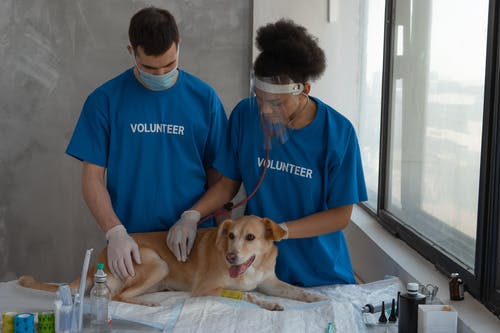
Preventive veterinary medicine empowers you to safeguard your pet’s health proactively. It encompasses periodic wellness checks to monitor vital signs and detect abnormalities early, appropriate and timely vaccinations to immunize against common pet diseases, diets, and exercise regimens that foster a healthy lifestyle.
Additionally, dental care, parasitic control, and necessary treatments like spaying or neutering are included. As a responsible pet owner, your understanding and application of preventive care can greatly enhance your pet’s longevity and quality of life.
Preventive Care for Pets: Setting the Foundation
Preventive care for pets is crucial in ensuring your pet lives a long, healthy life. Regular check-ups are a part of this care. An annual vet exam is a key part of preventive care, where the pet’s overall health is assessed.
The vet will check your pet’s overall health during these annual visits. They measure your pet’s weight, check their eyes, ears, and teeth, and listen to their heart and lungs. Routine health check-ups can help detect diseases early, making treatment more effective.
Dealing with Aspects of Routine Care for Pets
Crucial Role of Vaccinations
Vaccinations are a crucial part of pet health. These immunities play a vital role in the prevention of many dangerous diseases. Core vaccinations, such as cat and dog vaccinations in Douglasville, are recommended for every pet.
Parasite Prevention in Pets
Parasites can be a nuisance to pets, causing significant discomfort and various health issues. Heartworm screening and measures to control tick-borne diseases in pets are essential aspects of preventive care.
Maintaining Pet’s Healthy Weight
Just like for humans, maintaining a healthy weight is critical for pets. Overweight pets are more prone to various health conditions ranging from arthritis to various heart conditions. Proper nutrition and regular exercise are vital in maintaining your pet’s healthy weight.
Disease Detection in Pets
Steps to Identifying Diseases before they Progress
When it comes to your pet’s health, early disease detection is critical for its successful treatment. Specialized veterinary internal medicine services have a pivotal role in this process. These services use a combination of methods and medical advancements to spot problems early on:
- Bloodwork: Regular blood tests can help detect several conditions, such as liver and kidney disease, diabetes, or low white cell count, which might indicate an infection. Regular blood tests can catch changes before visible symptoms appear.
- Urine testing: A urinalysis can reveal hydration status, infections, kidney or bladder disease, diabetes, and other health indicators in pets. Regular urine tests can help your vet monitor your pet’s health.
By taking these steps to detect diseases early, you can ensure that your pet gets the right treatment right away, preventing the condition from worsening.
Unveiling Genetic Diseases in Pets with DNA Analysis
Advancements in veterinary science now make it possible to use DNA analysis for pets to understand if they’re at risk for certain genetic diseases. This helps devise a preventive care plan that is customized to your pet.
Costs and Assistance with Preventive Care for Pets
A Look at Costs of Preventive Care
Although preventive care for pets can sometimes seem costly, the expense is small compared to the costs that can pile up if a disease is diagnosed late. Regular preventive care is a financial preventative measure too.
The Role of Pet Insurance in Preventive Care
Pet insurance for preventive care reduces the financial burden and promotes regular vet visits and timely treatments. Pet wellness plans also cover routine medical exams, vaccinations, and dental cleaning.
The Question of Spaying and Neutering
The Connection of Spaying and Neutering with Preventing Pet Illnesses
Spaying and neutering have been linked to a decrease in certain diseases. Apart from population control, these procedures can prevent potential health issues such as mammary tumors and uterine infections.
Tailoring Preventive Care with Age: Senior Pet Care
Special Care Needs of Senior Pets
As pets grow older, their healthcare needs change. Senior pet care involves adjustments in diet, additional screenings for age-related illnesses, and sometimes alterations in their exercise regimen too.
Caring for Your Pet’s Teeth
The Importance of Dental Care
Regular Douglasville veterinary dental solutions are not just about keeping your pet’s breath fresh. Dental health is linked to a pet’s overall health, with issues like tooth decay and gum disease potentially leading to more serious issues like heart disease and kidney problems if left untreated.
Conclusion
Understanding preventive veterinary medicine is key for every pet owner. Preemptive medicine for pets is a holistic approach that ensures the longevity and health of our beloved companions. It involves consistent vet exams, regular vaccinations, proper diet, parasite prevention, early disease detection, dental care, and age-specific care.
By investing in such comprehensive care, we contribute to an improved quality of life for our pets and avoid significant expenses associated with late-stage diagnoses or treatments. Remember, prevention is always better than cure, which also holds for our pets’ health.








